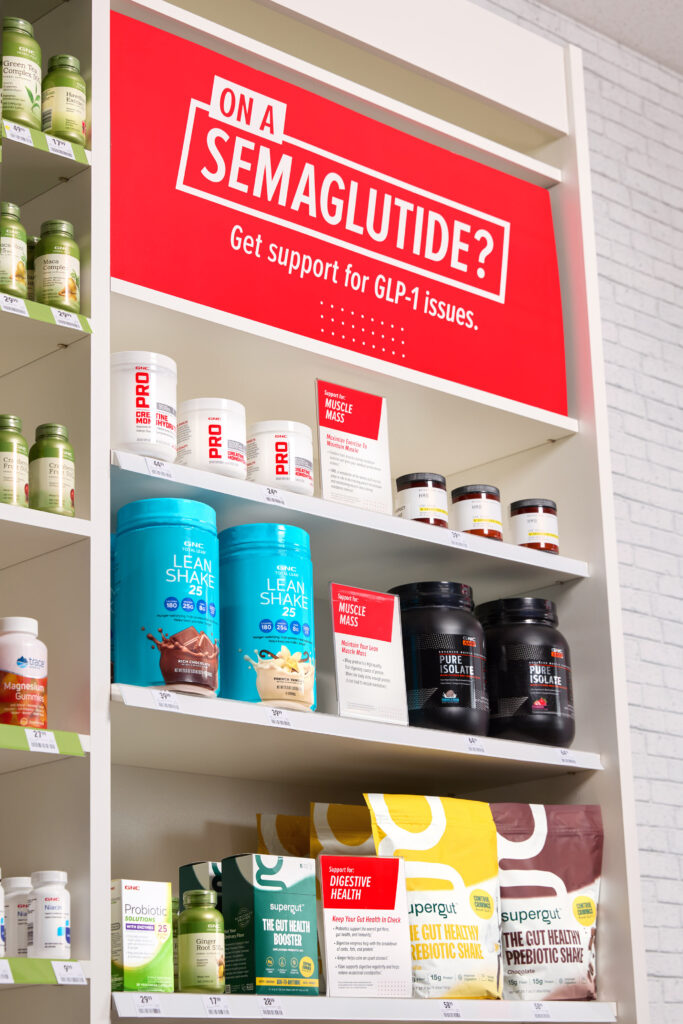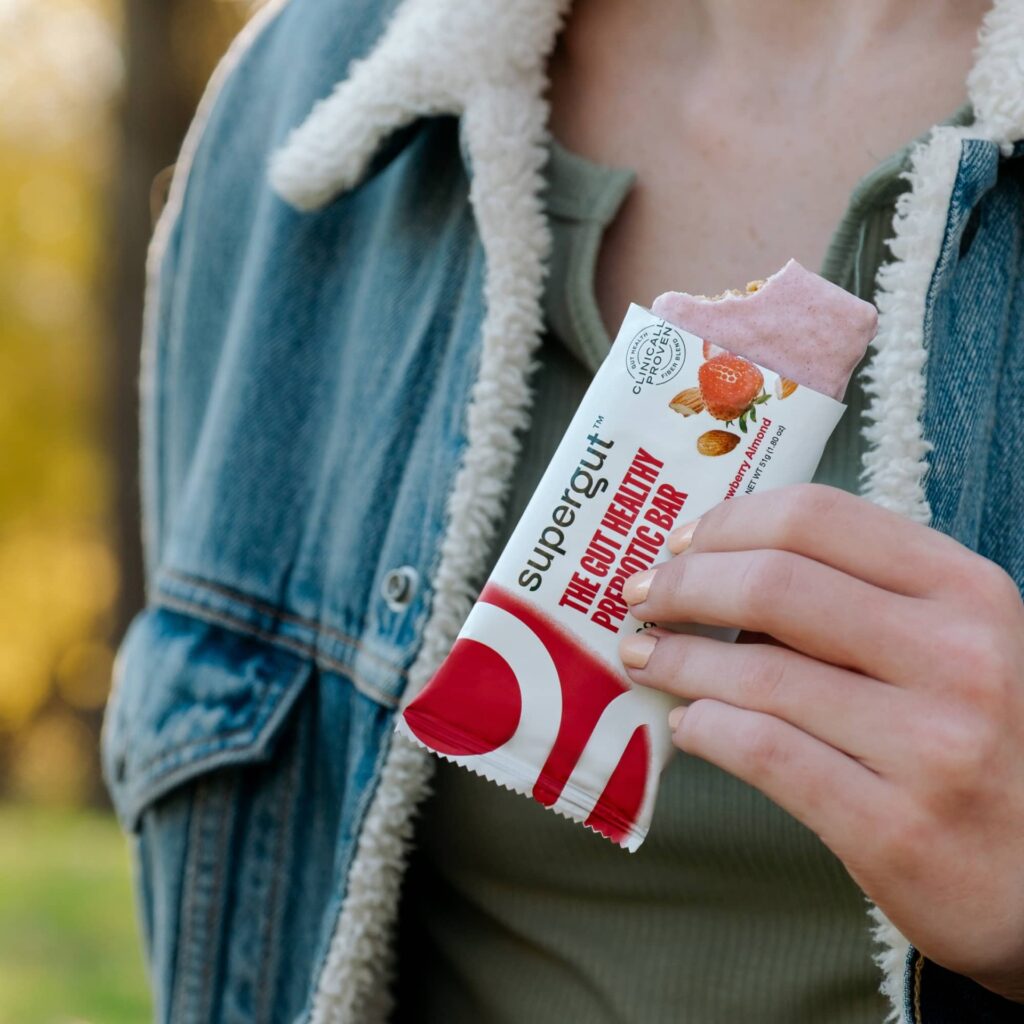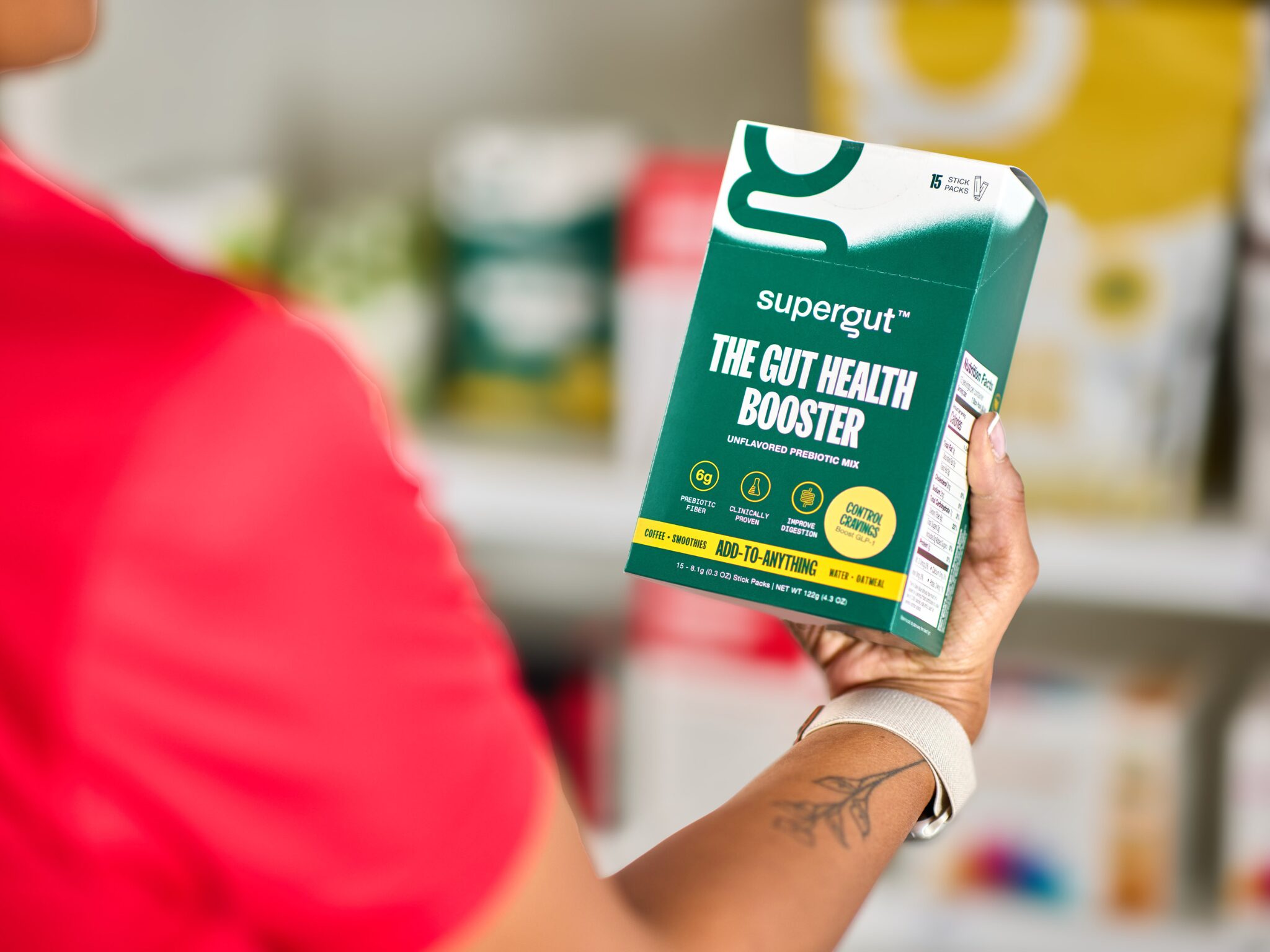5 Mins Read
Supergut, an emerging leader in the GLP-1 food space, is rolling out its superfood products at breakneck speed in US retail, after quadrupling sales over the last six months.
Your Erewhon smoothie could now help you control your appetite the way Ozempic does, with the upscale supermarket chain one of a number of retailers now stocking products from Supergut, the Los Angeles-based gut health brand cashing in on the GLP-1 food era.
Supergut, which makes prebiotic fibre products like the Gut Healthy GLP-1 Booster mix, snack bars and meal replacement shakes, had until earlier this year only been available online, but its debut into brick-and-mortar has now led to a nationwide expansion in thousands of retail stores.
It means you can find Supergut’s offerings at the GLP-1 nutritional support section at all 2,330 GNC locations (and its online store), as well as Fresh Thyme Markets, Gelson’s, Bristol Farms, Central Market and, of course, Erewhon. “At GNC, we are endlessly searching for the best products backed by science to help our customers achieve better health and live well, and we know those looking to improve their digestive health can turn to Supergut as a recommended natural choice,” says GNC CEO Michael Costello.
The retail rollout comes after the company quadrupled its sales over the last two quarters, with its popularity meaning it has sold out of some products three times. “We’re seeing unprecedented demand from consumers and forward-thinking retailers wanting to get ahead of the historic shift we’re experiencing across food, health and nutrition,” notes Supergut founder and CEO Marc Washington.
Supergut mimics Ozempic, minus the bad stuff

Founded in 2019 as Muniq, a gut supplement brand, the company rebranded to Supergut in 2022 to widen its focus to gut-healthy superfoods and appetite control, just as the uptake of GLP-1 agonist drugs like Wegovy and Ozempic began shaking up the pharma and food industries.
Today, it is part of a growing cohort of brands targeting the GLP-1 food space with prebiotic fibre. GLP-1 medications have exploded in popularity – one in 60 Americans was prescribed semaglutide in 2023 – and will continue to do so, given their efficacy in appetite control and weight loss. They work by replicating a natural hormone called incretin, which boosts GLP-1 to help regulate blood sugar, fulfil satiety and manage weight. But many consumers are apprehensive about their associated side effects, which include vomiting, nausea, constipation and diarrhoea and can take months to subside.
In our bodies, incretin can be regulated by dietary fibre and fermented foods. Supergut’s products take this approach, nourishing the gut microbes through its prebiotic fibre, slowing down digestion, signalling the brain to stop eating, and improving the body’s insulin response. It’s exactly what weight-loss drugs do, but without the side effects.
In the US, only 5% of adults meet the daily requirement of fibre intake, with the average consumption half the recommended amount. To counter that, Supergut has developed a patented resistant starch fibre blend, which features green banana powder, beta-glucans from oats, soluble vegetable fibre from maize, and potato starch.
“A natural approach to appetite control and not walking around feeling hungry, maybe wanting to lose a couple [of] pounds – that’s relevant for almost every person with a heartbeat, right?” Washington outlined in an extensive interview with Green Queen in February. “We present that for them… It’s even relevant for a crowd that’s not going to use Ozempic per se.”
And it seems that Supergut is a crowd favourite – something you can tell not just by the sales hike, but also consumer reception to its products. In a survey of 1,300 Supergut users conducted earlier this month, 74% reported fewer cravings and better weight control when consuming Supergut daily. Meanwhile, 78% of GLP-1 users who bought its products to maintain or improve results found it to be effective at curbing cravings and supporting weight management.
Finally, people who consumed Supergut while on a GLP-1 drug were four times less likely to experience severe, drug-related side effects, and 56% felt minimal to no side effects.
The GLP-1 impact on food businesses

The impact of Ozempic, Wegovy, Monjauro and the like on the food sector cannot be understated. We’re seeing giants like Unilever, Nestlé and Danone weigh up gut health offerings to meet the market where it’s at, snacking and beverage companies fast losing share, and health-skewed fast-casual restaurants gaining ground. Food industry executives are calling up pharma bosses to express their fears and ask for advice about succeeding in the post-Ozempic food era.
“Industry giants like Walmart already indicated that they’re seeing a ‘slight pullback’ in spending on traditional groceries from consumers on these weight loss drugs,” Washington tells Green Queen. “As GLP-1 drugs become more mainstream, I think the impacts are going to become increasingly clear. Increasing pressure will be on traditional, nutritionally vapid, hyper-processed junk foods. And a shift towards more nutrient-dense functional foods that promote satiety, nourish our gut, and deliver essential nutrients (most importantly protein and fibre) in convenient and affordable packaging.”
He adds: “More brands will continue incorporating and advertising hunger-killing combinations of protein, fibre and prebiotics into products to offer natural approaches to satisfy hunger and boost GLP-1. Supergut is already very well-positioned for this Ozempic era, and we’re seeing a significant surge in demand from consumers looking for a natural approach to curb cravings, support health weight management, and nourish your gut for improved digestive health.”
But the surge in popularity also brings about one of the brand’s biggest obstacles: scaling up operations and supply chains to keep up with the demand. “Going forward, I believe the two biggest challenges in further expanding consumer adoption of Supergut are brand awareness and distribution,” says Washington. “We will continue to invest in building brand awareness through our marketing, content, and social.”
And while moving into retail is a step in that direction, does Supergut have foodservice on its radar? A recent survey by Morgan Stanley found that while 31% of GLP-1 drug users are spending less on grocery shopping, but an even larger number spend less on restaurants (63%) and takeout (61%). Our primary focus right now is to expand as an omnichannel business across our website, our Amazon store, and brick-and-mortar retail stores. Increasing our distribution will allow us to effectively address the surging consumer interest in nutritional options and support related to GLP-1s,” Washington explains.
“That being said,” he adds, “we are open to exploring foodservice options in the future as additional pathways to introduce consumers to Supergut by encouraging trial and hopefully motivating them to come back and purchase our products from our website, Amazon storefront, or from one of our retail partners.”



